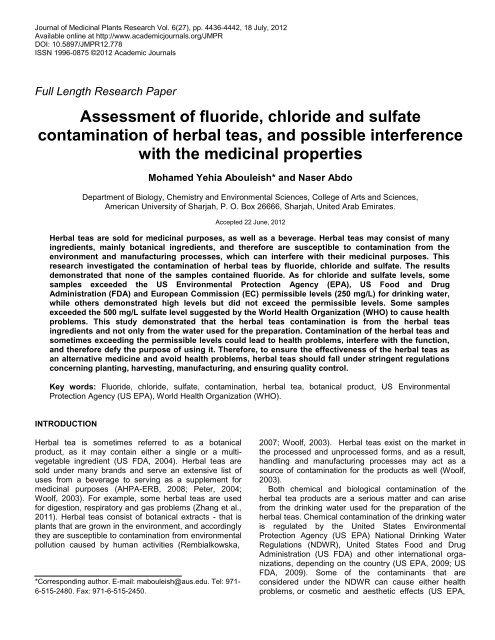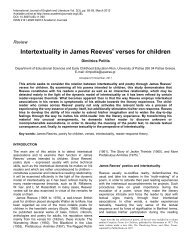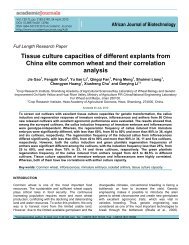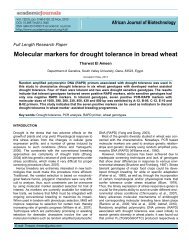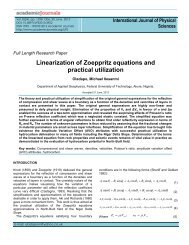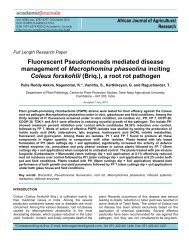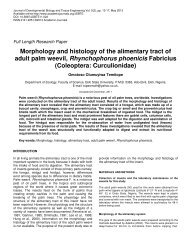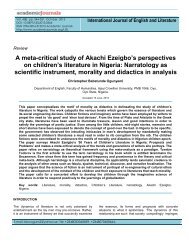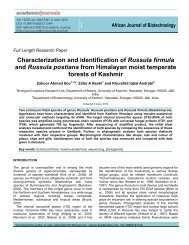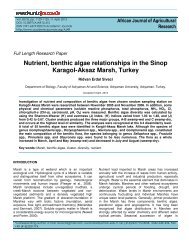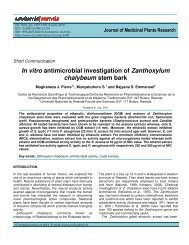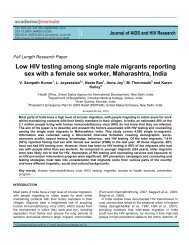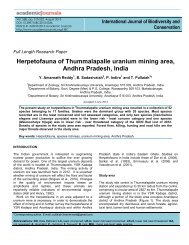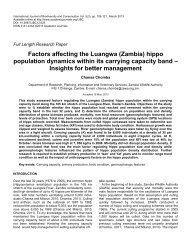Download Complete Issue (4740kb) - Academic Journals
Download Complete Issue (4740kb) - Academic Journals
Download Complete Issue (4740kb) - Academic Journals
You also want an ePaper? Increase the reach of your titles
YUMPU automatically turns print PDFs into web optimized ePapers that Google loves.
Journal of Medicinal Plants Research Vol. 6(27), pp. 4436-4442, 18 July, 2012<br />
Available online at http://www.academicjournals.org/JMPR<br />
DOI: 10.5897/JMPR12.778<br />
ISSN 1996-0875 ©2012 <strong>Academic</strong> <strong>Journals</strong><br />
Full Length Research Paper<br />
Assessment of fluoride, chloride and sulfate<br />
contamination of herbal teas, and possible interference<br />
with the medicinal properties<br />
Mohamed Yehia Abouleish* and Naser Abdo<br />
Department of Biology, Chemistry and Environmental Sciences, College of Arts and Sciences,<br />
American University of Sharjah, P. O. Box 26666, Sharjah, United Arab Emirates.<br />
Accepted 22 June, 2012<br />
Herbal teas are sold for medicinal purposes, as well as a beverage. Herbal teas may consist of many<br />
ingredients, mainly botanical ingredients, and therefore are susceptible to contamination from the<br />
environment and manufacturing processes, which can interfere with their medicinal purposes. This<br />
research investigated the contamination of herbal teas by fluoride, chloride and sulfate. The results<br />
demonstrated that none of the samples contained fluoride. As for chloride and sulfate levels, some<br />
samples exceeded the US Environmental Protection Agency (EPA), US Food and Drug<br />
Administration (FDA) and European Commission (EC) permissible levels (250 mg/L) for drinking water,<br />
while others demonstrated high levels but did not exceed the permissible levels. Some samples<br />
exceeded the 500 mg/L sulfate level suggested by the World Health Organization (WHO) to cause health<br />
problems. This study demonstrated that the herbal teas contamination is from the herbal teas<br />
ingredients and not only from the water used for the preparation. Contamination of the herbal teas and<br />
sometimes exceeding the permissible levels could lead to health problems, interfere with the function,<br />
and therefore defy the purpose of using it. Therefore, to ensure the effectiveness of the herbal teas as<br />
an alternative medicine and avoid health problems, herbal teas should fall under stringent regulations<br />
concerning planting, harvesting, manufacturing, and ensuring quality control.<br />
Key words: Fluoride, chloride, sulfate, contamination, herbal tea, botanical product, US Environmental<br />
Protection Agency (US EPA), World Health Organization (WHO).<br />
INTRODUCTION<br />
Herbal tea is sometimes referred to as a botanical<br />
product, as it may contain either a single or a multivegetable<br />
ingredient (US FDA, 2004). Herbal teas are<br />
sold under many brands and serve an extensive list of<br />
uses from a beverage to serving as a supplement for<br />
medicinal purposes (AHPA-ERB, 2008; Peter, 2004;<br />
Woolf, 2003). For example, some herbal teas are used<br />
for digestion, respiratory and gas problems (Zhang et al.,<br />
2011). Herbal teas consist of botanical extracts - that is<br />
plants that are grown in the environment, and accordingly<br />
they are susceptible to contamination from environmental<br />
pollution caused by human activities (Rembialkowska,<br />
*Corresponding author. E-mail: mabouleish@aus.edu. Tel: 971-<br />
6-515-2480. Fax: 971-6-515-2450.<br />
2007; Woolf, 2003). Herbal teas exist on the market in<br />
the processed and unprocessed forms, and as a result,<br />
handling and manufacturing processes may act as a<br />
source of contamination for the products as well (Woolf,<br />
2003).<br />
Both chemical and biological contamination of the<br />
herbal tea products are a serious matter and can arise<br />
from the drinking water used for the preparation of the<br />
herbal teas. Chemical contamination of the drinking water<br />
is regulated by the United States Environmental<br />
Protection Agency (US EPA) National Drinking Water<br />
Regulations (NDWR), United States Food and Drug<br />
Administration (US FDA) and other international organizations,<br />
depending on the country (US EPA, 2009; US<br />
FDA, 2009). Some of the contaminants that are<br />
considered under the NDWR can cause either health<br />
problems, or cosmetic and aesthetic effects (US EPA,


